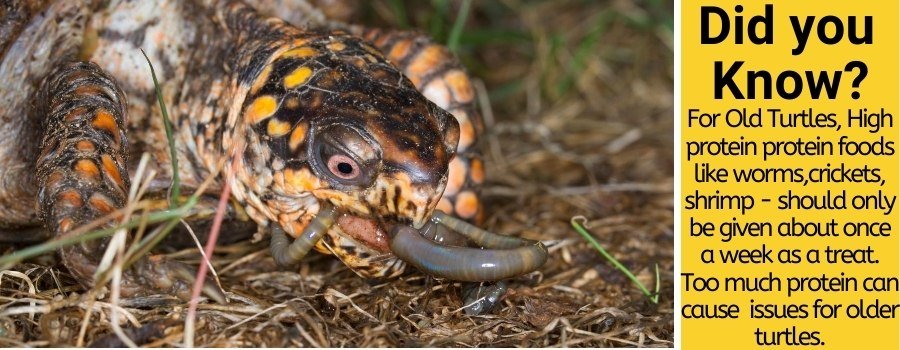Can Box Turtles Eat Hornworms

Hornworms are a common treat for reptiles, especially those that enjoy live prey. But can box turtles eat hornworms? The answer is yes!
In fact, many turtle owners consider them to be a staple in their pet’s diet. Hornworms are high in protein and moisture, and they’re easy to digest. Plus, they’re a good size for most box turtles.
Hornworms are a type of caterpillar that can be found in gardens and fields. They are the larvae of the Hawk Moth, and they get their name from their long, curved horns. While they may look dangerous, they are actually harmless to humans.
However, they can wreak havoc on gardens, as they love to eat plants.If you have box turtles as pets, you may be wondering if it’s okay to feed them hornworms. The answer is yes!
Box turtles love to eat hornworms, and they provide a good source of protein for your pet turtle. Just make sure to offer them in moderation, as too many can lead to weight gain.
Box Turtles are Crazy for Worms!
Can Box Turtles Eat Superworms
While box turtles are omnivorous and will eat a wide variety of foods, there are some things that you should avoid feeding them. One of these is superworms.Superworms are the larvae of a type of beetle.
They’re often used as live food for reptiles and amphibians, but they can be dangerous for box turtles. This is because they’re very high in fat and cholesterol, which can lead to health problems like obesity and heart disease in turtles. They’re also quite hard to digest, so they can cause gastrointestinal issues.
If you do decide to feed your box turtle superworms, make sure to do so in moderation and offer other healthy foods as well.
Can Aquatic Turtles Eat Hornworms
Aquatic turtles are often thought of as carnivores, but they are actually omnivores. This means that they will eat both plants and animals. While their diet consists mostly of meat, aquatic turtles will also consume small amounts of vegetation.
One type of plant that aquatic turtles may eat is hornworms. Hornworms are the larvae of moths and butterflies. They get their name from the horn-like projection on their back end.
Hornworms are a good source of protein for aquatic turtles. They are also low in fat and high in moisture, which is ideal for turtles that live in water. In addition, hornworms are easy to digest and provide a variety of vitamins and minerals.
If you’re looking to add some variety to your turtle’s diet, hornworms could be a good option. Just be sure to offer them in moderation since they are high in calories.
Can Red Eared Slider Turtles Eat Hornworms
Red Eared Slider Turtles are omnivores, so their diet consists of both plant and animal matter. While hornworms are not a natural part of their diet in the wild, they can be an occasional treat for your pet turtle.Hornworms are high in protein and calcium, which is good for your turtle’s overall health.
However, they should only be given to your turtle occasionally as too much protein can cause health problems. When feeding hornworms to your turtle, make sure to cut them into small pieces so that they can digest them properly.
Can Box Turtles Eat Nightcrawlers
If you’re wondering if box turtles can eat nightcrawlers, the answer is yes! Nightcrawlers are a great source of protein for these little guys, and they absolutely love them. Just be sure to offer them in moderation, as too many can cause gastrointestinal issues.

Credit: www.lovetoknowpets.com
Are Hornworms Poisonous to Turtles?
Hornworms are a type of caterpillar that can be found in gardens and fields. They get their name from the horn-like projection on their back end. While they are not poisonous to turtles, they can cause an upset stomach if eaten.
What Animals Can Eat Hornworms?
Hornworms, also known as tomato hornworms, are voracious eaters that can quickly decimate a tomato crop. But what other animals enjoy feasting on these fat, juicy caterpillars?One of the most common predators of hornworms is the braconid wasp.
These small parasitic wasps lay their eggs inside the hornworm caterpillars. When the eggs hatch, the wasp larvae begin to eat the caterpillar from the inside out. The caterpillar eventually dies and the wasp larvae pupate inside its host’s body.
Another predator of hornworms is the green lacewing. The adult lacewings don’t actually eat hornworms but their larvae are voracious predators. Lacewing larvae have long, curved mandibles that they use to slice through their prey’s exoskeleton and then suck out its insides.
Yum!Other predators of hornworms include ground beetles, ladybird beetles (also known as ladybugs), and some species of birds such as bluebirds, robins, and flickers. So if you’re finding holes in your tomato plants and suspecthornworms might be to blame, take heart knowing that there are plenty of creatures out there who would love nothing more than to help you control this destructive pest!
Can Box Turtles Eat Grub Worms?
Yes, box turtles can eat grub worms. These small, white worms are a common food source for many reptiles and amphibians. They are high in protein and moisture, which makes them ideal for growing box turtles.
However, grub worms should only be given to box turtles as a occasional treat. Too many grub worms can lead to health problems such as obesity and liver disease.
How Many Worms Does a Box Turtle Eat?
Most box turtles are opportunistic feeders and will eat a wide variety of food items. However, they seem to prefer soft-bodied invertebrates, such as earthworms, snails, and slugs. A single adult box turtle can consume up to 10 earthworms per day.
Conclusion
Yes, box turtles can eat hornworms. These caterpillars are packed with nutrients and make a great treat for your turtle. Just be sure to offer them in moderation as part of a well-rounded diet.